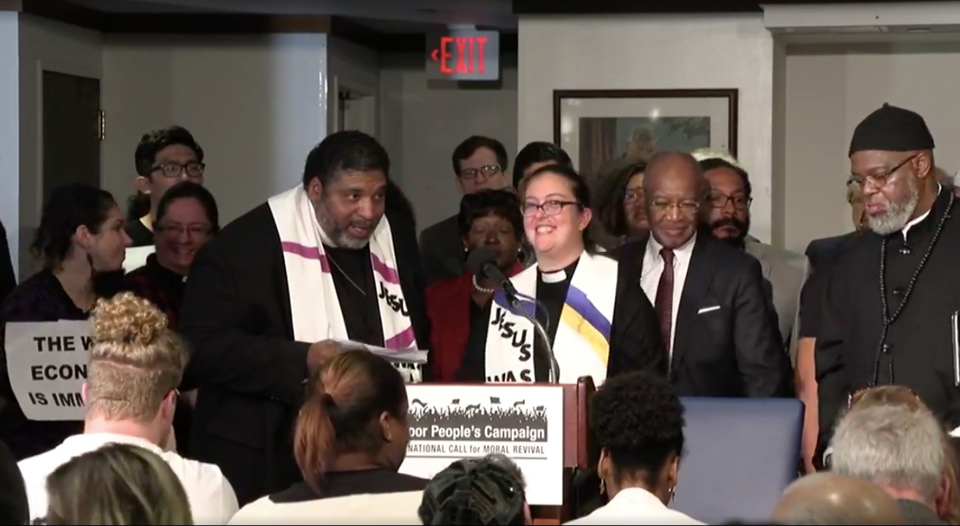
WASHINGTON—A new Poor People’s Campaign, building on and expanding the drive of Dr. Martin Luther King, Jr.’s original 50 years ago, launched on April 10 with a comprehensive report linking poverty, systemic racism, repression of voting rights, ecological disasters, and the war economy, as its organizers announced weeks of peaceful civil disobedience to combat those causes, starting on Mother’s Day.
The campaign will hit a high point with a mass march on Washington, D.C., on June 23, fusing all those issues together, said its leaders, the Revs. William Barber and Liz Theoharis. But it won’t stop there, they told a D.C. press conference.
Instead, using the data from the report, The Souls of Poor Folk, 50 Years Later, and the moral principles of both the Torah (Old Testament) and the New Testament, the campaigners, led by the people themselves, will lobby for eradication of the conditions the nation’s 140 million poor suffer. That effort will last years, and will cover both Congress and state legislatures, Barber and Theoharis said.
“Woe unto those who legislate evil,” Barber said, paraphrasing the prophets. “The true change forward must be from the bottom up, led by the people who are impacted—by them and not for them. Move-ments don’t start from D.C. and New York down, but from Selma and Montgomery [Alabama] up.”
The point, Theoharis told a packed press conference, is to change the nation and especially its moral compass, which has been hijacked too often by militarism, repression, and often right-wing religiosity.
That change is in line with Rev. Barber’s “Moral Mondays” campaign, which began in his native North Carolina against voter suppression by a right-wing state government and has since spread to other states.
Barber took time out to dispel one myth, more than once. Contrary to popular impression, “The majority of people affected by poverty are white,” he said, as one of the poor, Kelly Greer of Selma, Ala., made her way towards the podium.
Greer said she is marching and lobbying not just for herself, but for “mothers, fathers, daughters, sons, kids, and grandkids.” The Poor People’s Campaign already has local organizing committees in states ranging from Alabama through New York and Washington state.
Though speakers took an occasional shot at politicians, including President Donald Trump, they blamed the nation’s lack of a moral compass on both parties.
“We cannot allow people to pray, p-r-a-y for presidents and politicians while they are preying p-r-e-y-i-n-g on the poor,” Barber said. “Something is wrong when four million people are dying” of poverty in the U.S., yearly.
Changing the moral compass, the two pastors and other speakers said, means changing away from a war economy to one that provides universal health care, state and federal living wage laws, guaranteed jobs—notably in infrastructure—and an end to ecological disasters which often fall hardest on the poor.
It also means “the right for all workers to form and join unions,” Barber said.
The report notes that 50 years ago, at the height of the Indochina War, federal military spending outran spending on programs to help the poor by a 2-to-1 ratio. Now it’s 4-to-1, and Rev. Barber said Trump’s proposed budget for next year would make it 5-to-1.
Speakers said changing the moral compass also means complete restructuring of a criminal justice system that demonizes the black, the brown, and homeless of any race; repeal of voter repression laws; and renewal and strengthening of the Voting Rights Act.
It also would include “a clear route to citizenship” for all immigrants, plus “renewal of the right to vote for the formerly incarcerated,” Barber said. The report estimates some six million now-released people have lost that right.
“Where I come from,” in Aberdeen, Wash., “46 percent of the city is on public assistance,” said the Rev. Sarah Monroe, who pointed out Aberdeen is three-quarters white. “And one of every 16” people in the city “are homeless.”
“Poverty gets criminalized,” she added, citing police picking people up for such offenses as camping in the parks, or arresting people who have to steal food to live or for working in the underground economy. “They face excessive police violence and are caged at a higher rate than anyone else.”
Changing the moral compass also means barring states from enacting “pre-emption laws” taking away the rights of citizens, cities, and towns to better themselves economically. And it demands taxation of the rich to pay their fair share and repeal of the 2017 tax cut for rich and corporations, with the money—$1.5 trillion over 10 years—redirected to social programs.
The report, by the Institute for Policy Studies, the Urban Institute, and other groups, lays out the data and the recommendations. “The forces of racism, poverty, war and ecological devastation are linked,” said co-author Saurav Sarkar of IPS. The report is available on both the Poor People’s Campaign and IPS websites.
Unions and more than 100 other groups have already signed on to the campaign. Group representatives at the press conference included the Service Employees—led by President Mary Kay Henry—the Steelworkers, the Physicians for a National Health Plan, the Friends Committee on National Legislation, AFSCME, Unitarian and Christian ministers, Muslim imams, and Jewish rabbis.
“The two million members of SEIU and the millions more in other unions represented here are proud to stand with the Poor People’s Campaign,” Henry said. “We know no one organization can accomplish these demands alone. The time is now to stand together.”
The weeks of peaceful civil disobedience will each concentrate on a different aspect of eradicating poverty, Rev. Barber said. It will start with the impact of systematic racism, then move on to the impact of the war economy, poverty among people with disabilities, and ecological impacts on the poor.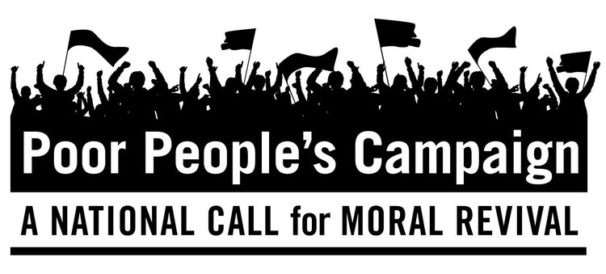
“The mass mobilization at the Capitol on June 23 will be the beginning of a multi-year state-based campaign to transform the nation’s moral soul,” Barber declared. Without it, “There is no way we can save the heart and soul of this democracy.”
Barber, however, cautioned listeners and viewers not just to view the new Poor People’s Campaign as an extension of Dr. King’s 1968 effort, which actually resulted—after his murder—in a mass encampment on Washington’s Mall, amid indifference or hostility from much of the rest of the country.
“This not another commemoration, another remembrance, but a resurrection.” And the combination of anti-war, pro-justice, pro-voting rights, pro-ecology, pro-criminal justice reform, and other goals “is a fusion.” Right now, he stated, their opposites—war, voter repression, ecological disasters, and an unjust criminal justice system among them—all contribute to the problems of the nation’s poor.



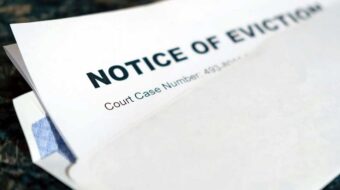
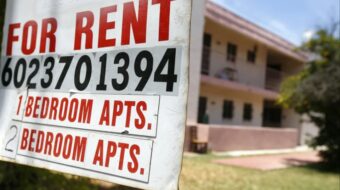
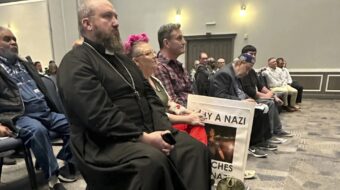






Comments